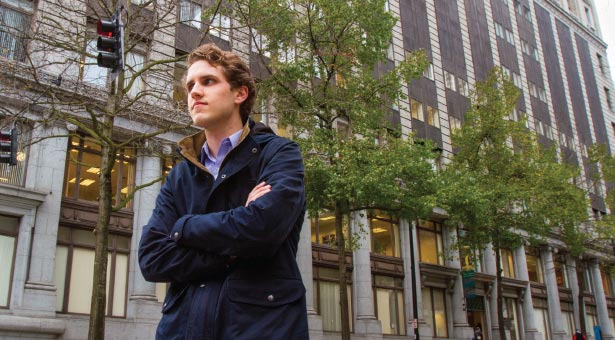Reconciliation at Work
SPU’s John Perkins Center Helps Students Bring Learning to Life
By Hope McPherson (hmcpherson@spu.edu) | Photo by Mike Siegel
 Tyler Scott connected with the King County Prosecuting Attorney's Office through SPU's John Perkins Center.
Tyler Scott connected with the King County Prosecuting Attorney's Office through SPU's John Perkins Center.
"Who here is 19 years old?” the former inmate asked a roomful of teens. No one raised a hand. “That means I've spent more time in prison than you've been alive.”
“At that point, he had everyone's respect,” recalls Tyler Scott, a 2012 Seattle Pacific University graduate and then intern with the King County Prosecuting Attorney's Office. “He was able to speak in an authentic manner to youth about when he was young in Seattle and had made mistakes that cost him 20 years of his life.”
As a political science major with a minor in reconciliation studies, Scott worked with SPU's John Perkins Center for Reconciliation, Leadership Training, and Community Development to find an internship that fit his academic requirements and his interest in the legal system. At the Prosecuting Attorney's Office, he was assigned to its new 180 Program — designed to help divert youth facing misdemeanor charges out of the criminal justice system.
Scott is one of many students to benefit from the network of relationships built by the Perkins Center with churches, nonprofits, companies, and government organizations. Founded in 2004, the Center is a partnership between SPU and John Perkins — internationally renowned reconciliation advocate — with the goal of equipping young urban leaders who will model reconciliation and contribute to “community health and wholeness.” For 10 years, the influence of the Perkins Center has grown, not only on campus and in the Pacific Northwest, but also in locales such as Jackson, Mississippi; South Africa; and Vietnam.
“We knew SPU's legacy was a wonderful fit with John Perkins' legacy,” says Tali Hairston, director of the Center. “Most people didn't realize that this son of African-American sharecroppers and a 120-year-old university had so much in common. We've proven that they do.”
Late last winter, Hairston took Scott to the King County Prosecuting Attorney's Office in downtown Seattle. There they met with Donnie Griffin, program manager of the 180 Program. Partnering with community members, the program invites eligible young adults facing misdemeanor charges to attend a community-based workshop where they hear from others who changed course after bad choices that often resulted in jail time. Charges are not filed against those young adults who attend.
Through his internship, Scott discovered that the collaboration between SPU's Perkins Center and the reconciliation studies program in the School of Theology provided a foundation for his future. He is now working full-time as a legal assistant for the Prosecuting Attorney's Office while applying to law school.
“Because of Tyler's training and the work he has done with the Perkins Center, he came to our office with a more advanced understanding of social justice measures and how those measures reflect on any system,” says Leesa Manion, chief of staff for the King County Prosecuting Attorney's Office. “While there was the tangible goal of diverting youth out of the system, he also understood there were intangible positives to the program, such as young adults empowered to believe they were better than the potential charges on a piece of paper.”
For Hairston, connecting students with opportunities for reconciliation work is a big part of what the Perkins Center is all about.
“It's not like finding them a job at Microsoft,” he explains. “The internship for the reconciliation studies minor isn't about giving students technical knowledge about reconciliation, because they've covered that in class. It's about experiencing the work of reconciliation. Through internships, students are experiencing day to day what it's like to be reconcilers.”
It's a principle Scott understands. “For four years I studied theology and political science, and tried to learn how to do it from textbooks and the classroom,” he says. “But I needed to experience it to understand it more fully.”
Learn more about the Perkins Center at spu.edu/perkins.
